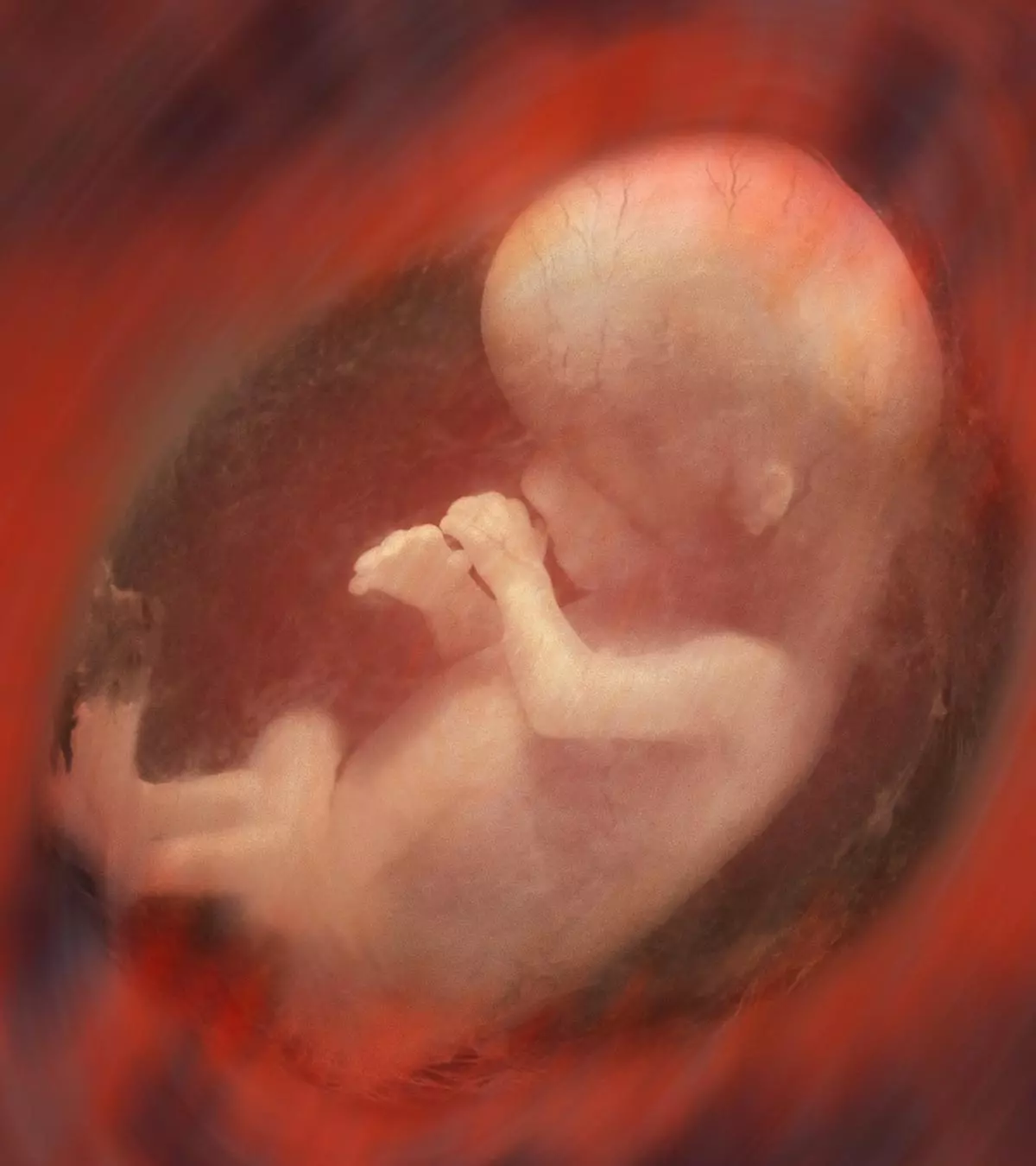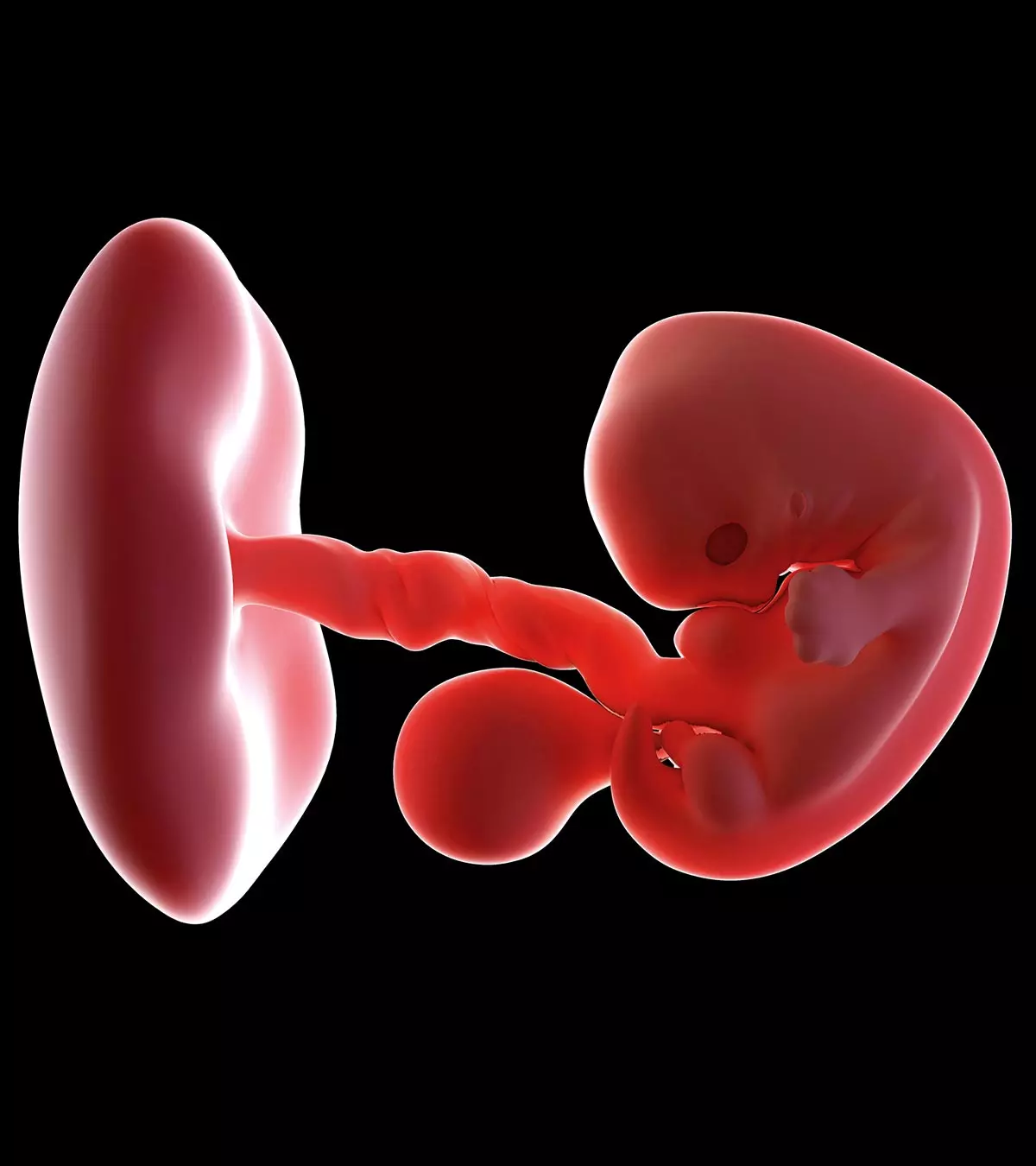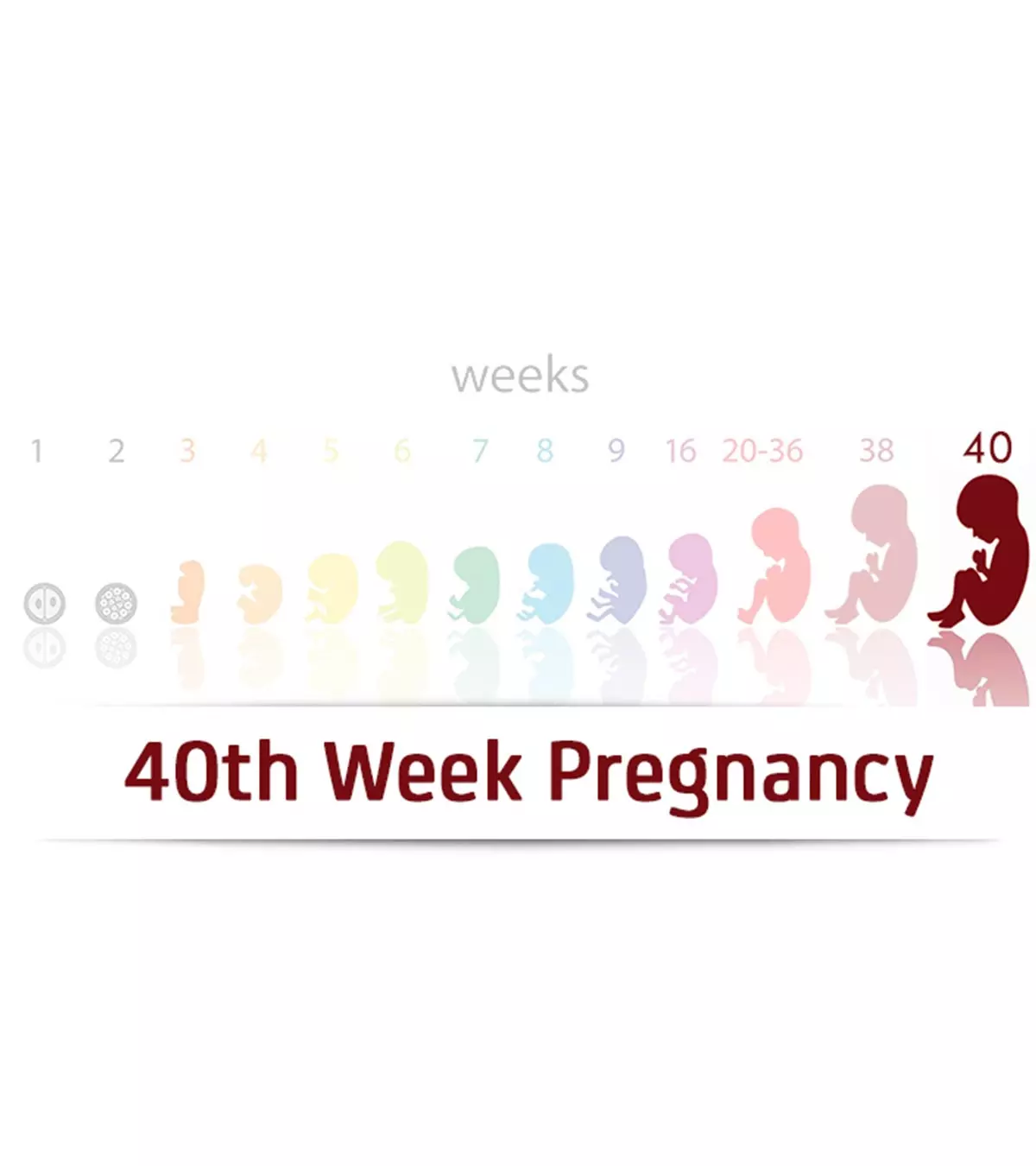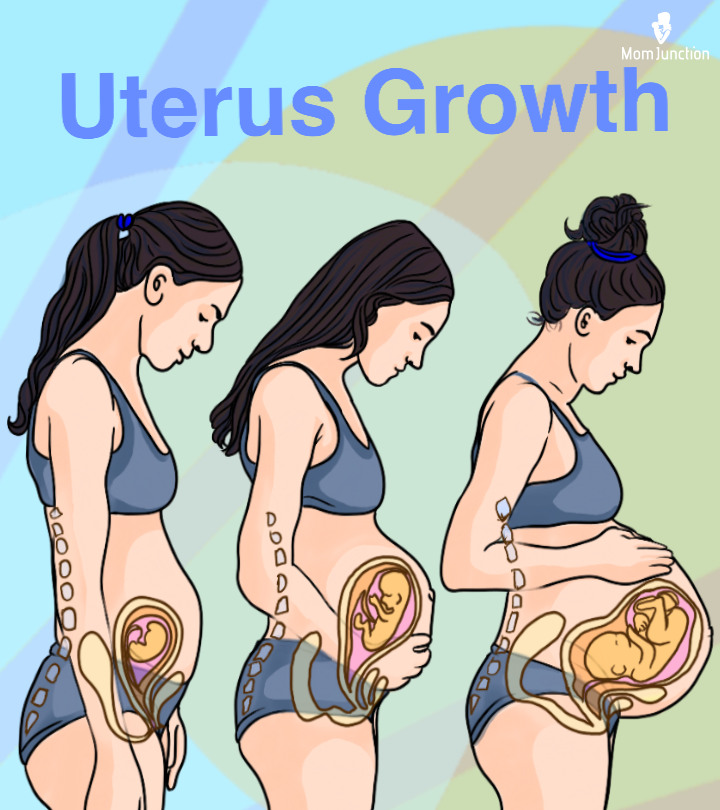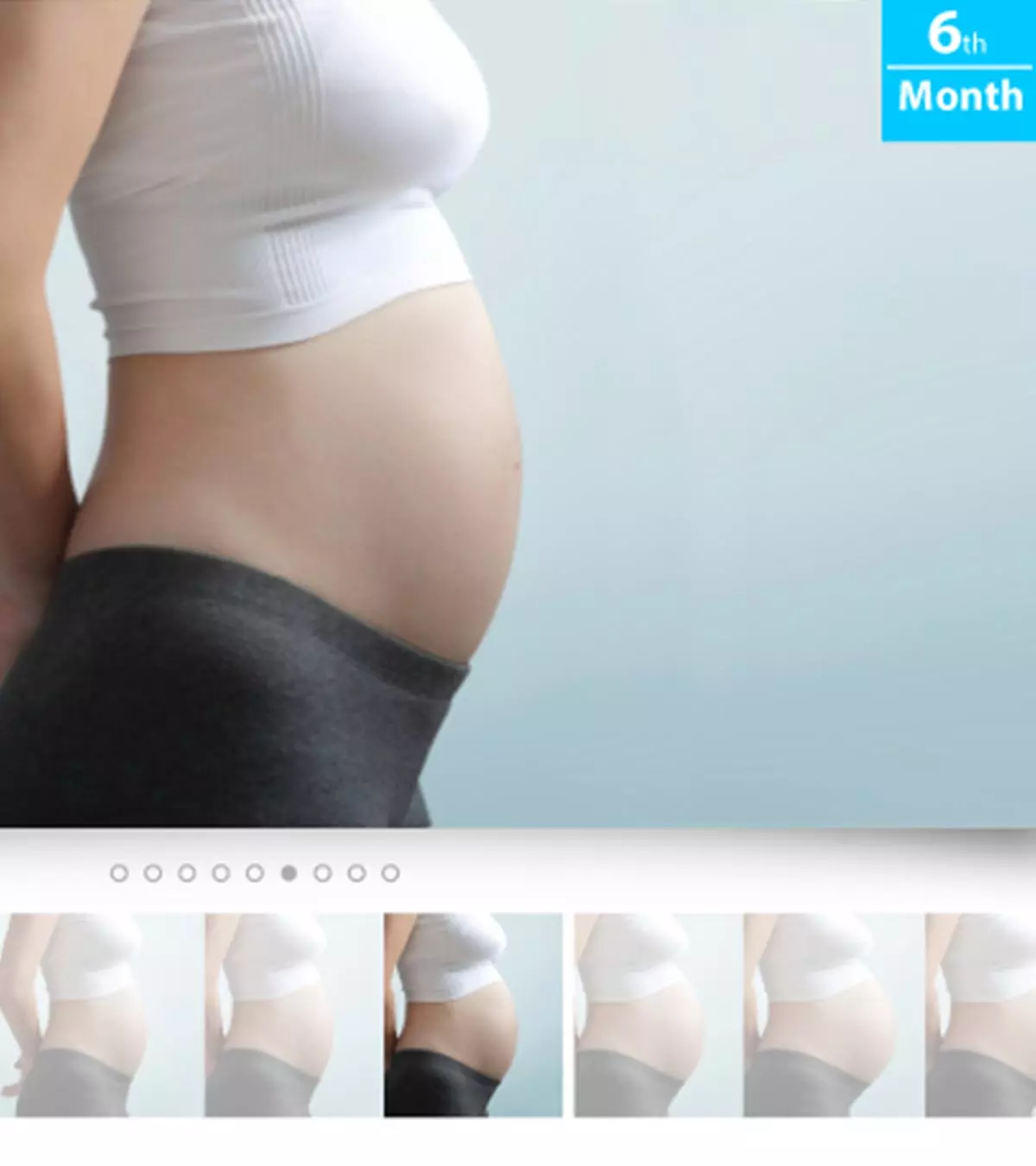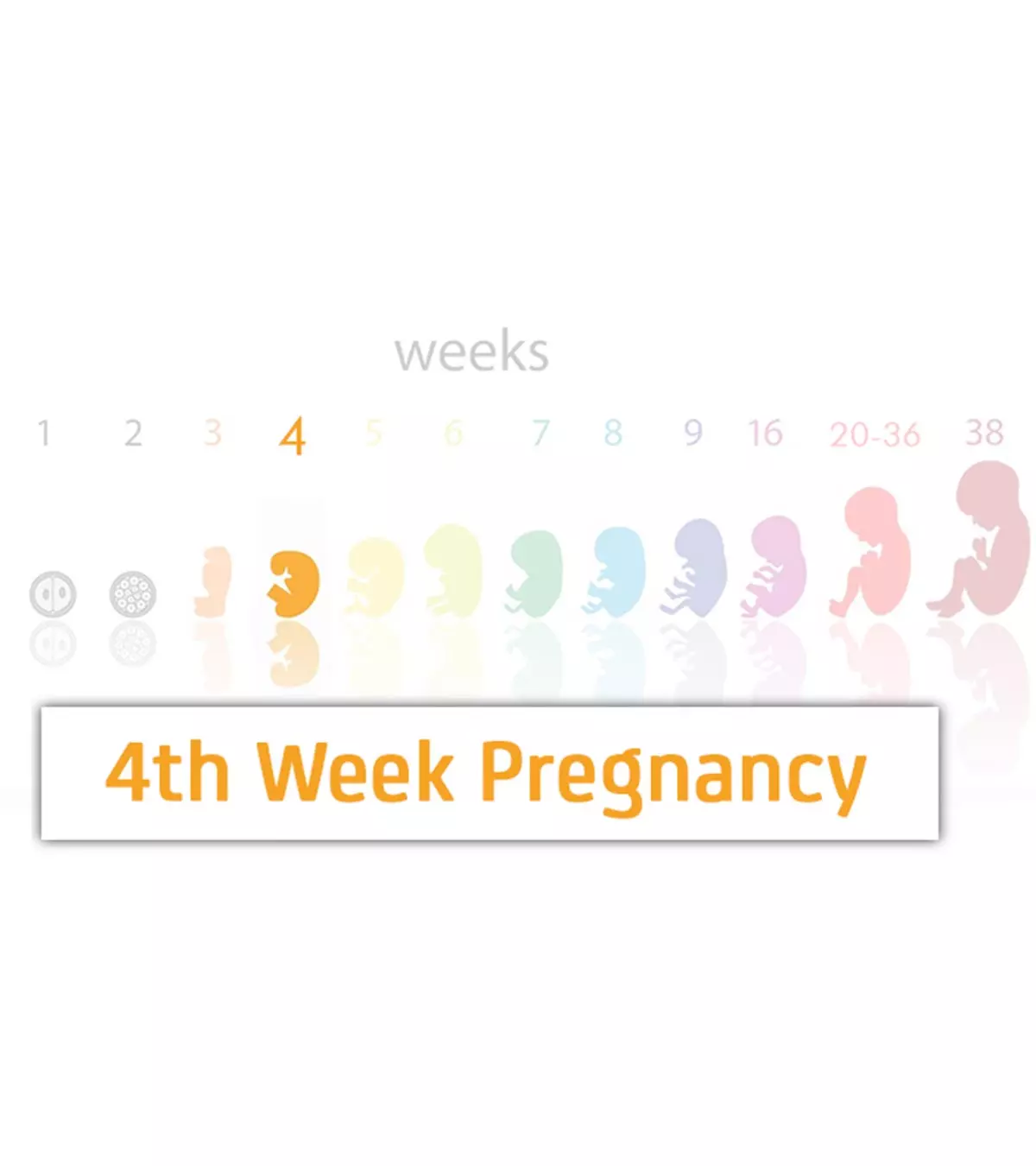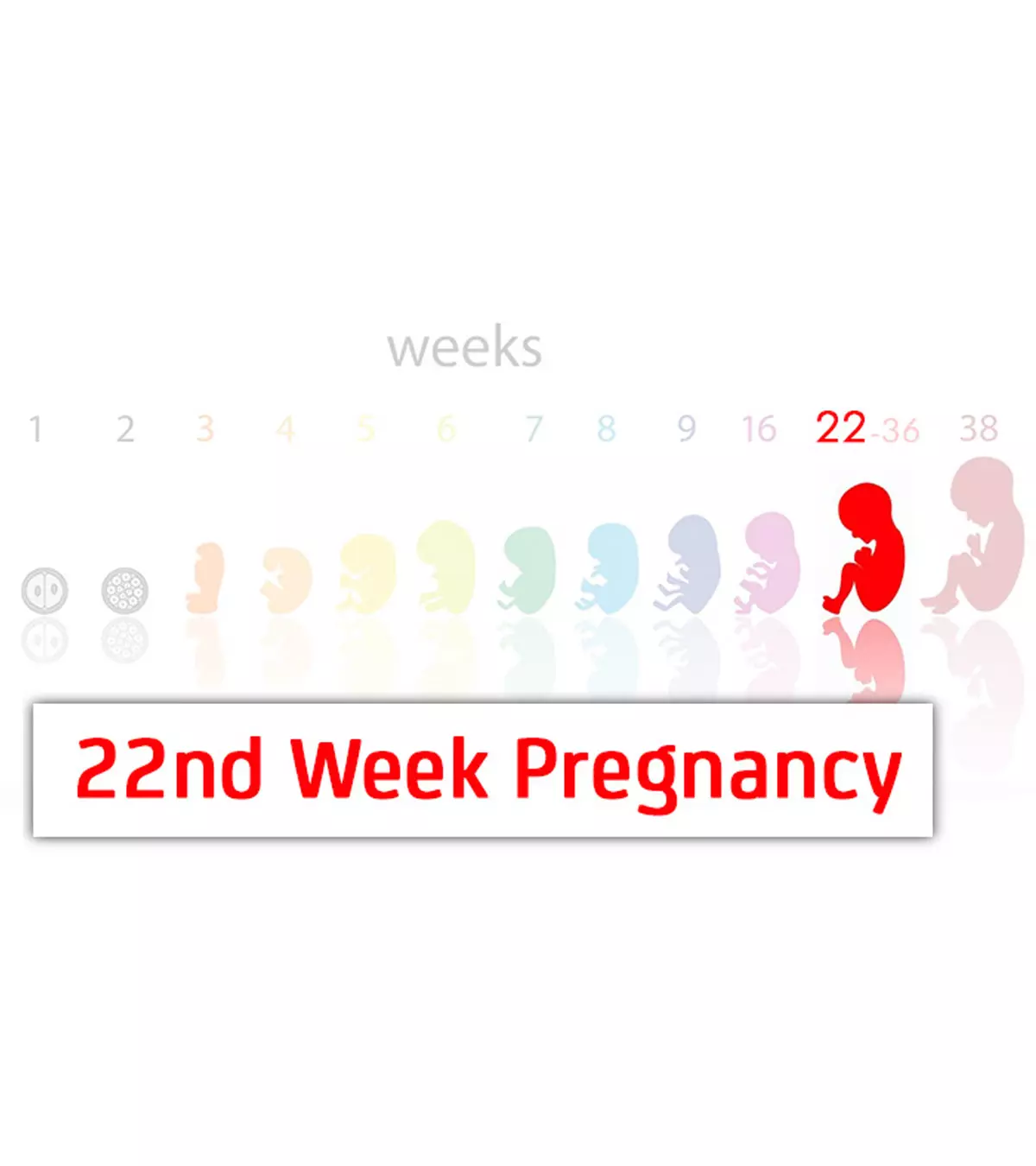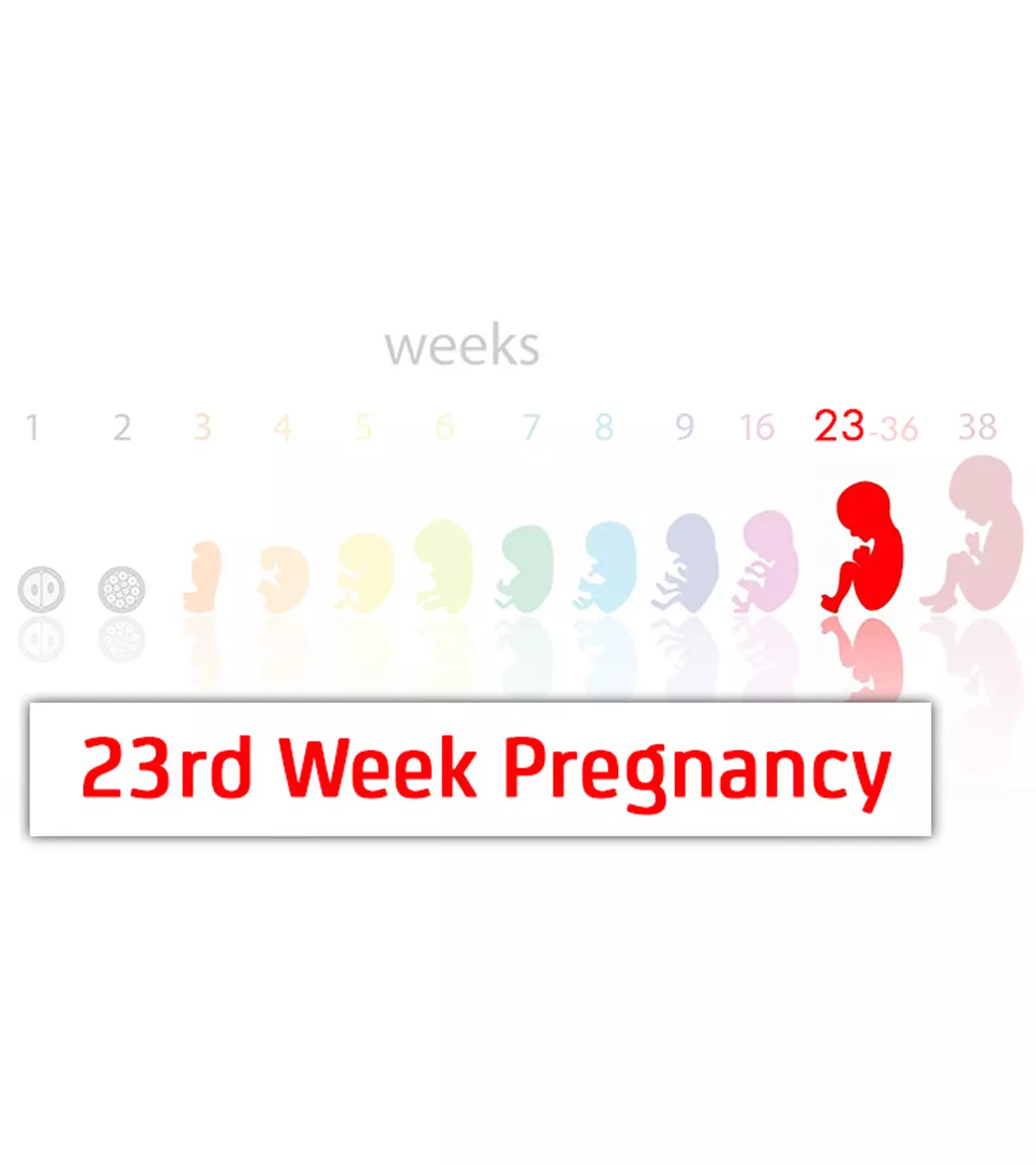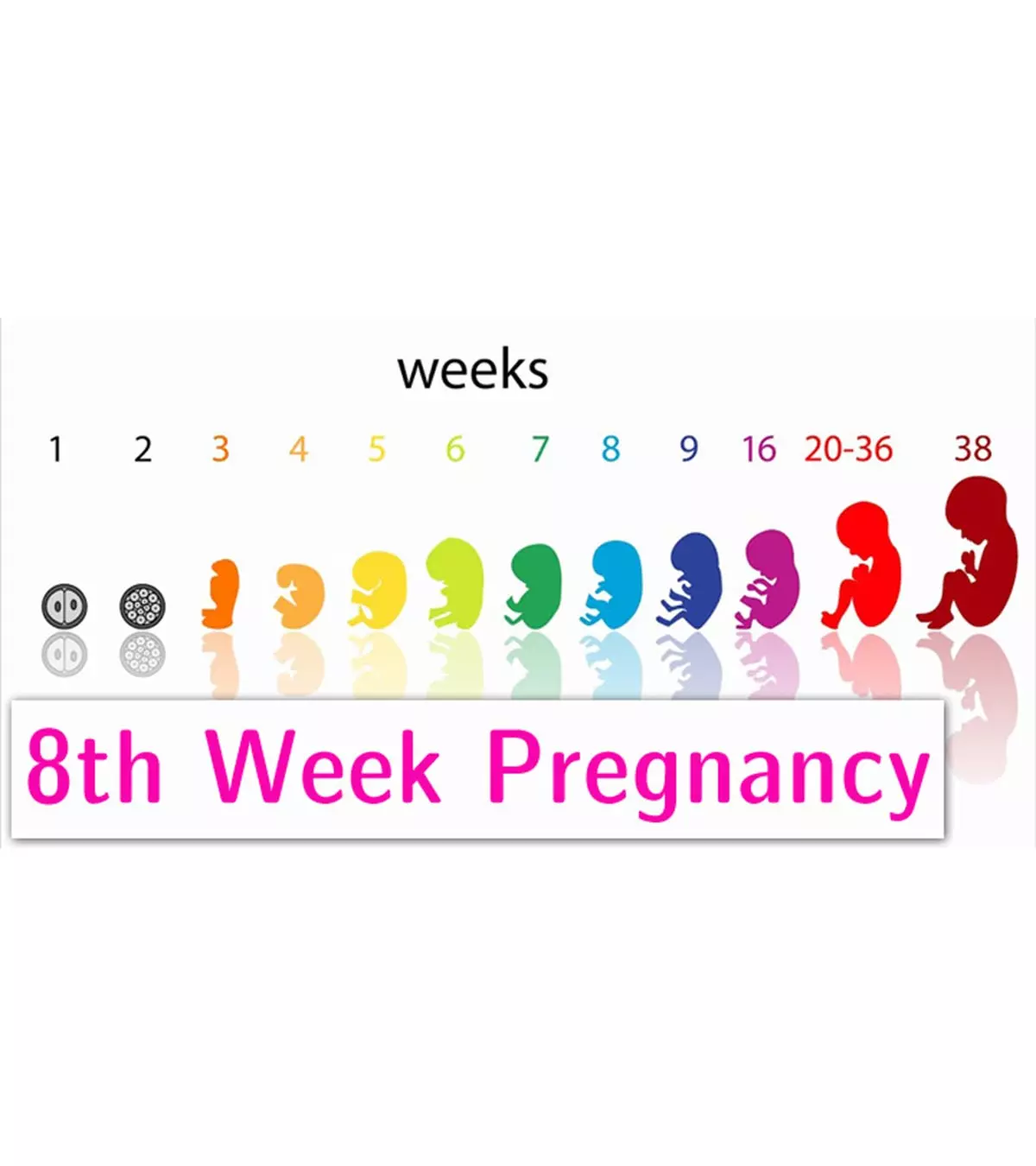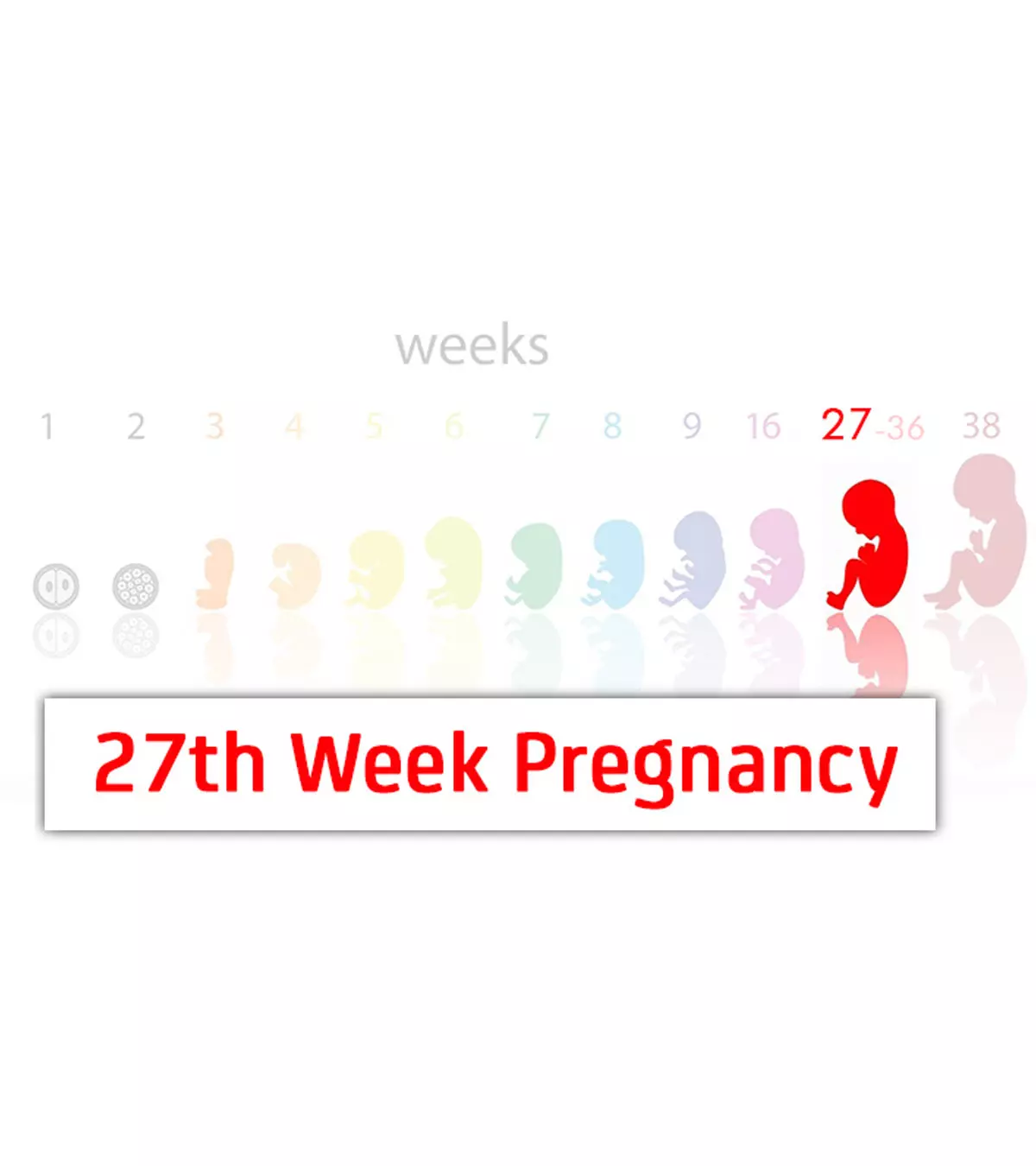
Image: ShutterStock

Key Pointers
- The baby is as big as the head of a cauliflower and measures 14.5 inches in length and 1.93 to 2.3 pounds in weight.
- The baby’s eyes are developing, the nose is operational, the skin is smoothing out, the brain is growing, and the nervous system is taking control of body functions.
- Symptoms include weight gain, leg cramps, constipation, hemorrhoids, Carpal Tunnel Syndrome, insomnia, frequent urination, swelling, and bleeding gums.
- Drinking enough water, regular exercise, and avoiding prolonged standing can alleviate pregnancy symptoms.
- A healthy diet consisting of grains, dairy, protein, fruits, vegetables, fats, and oils can promote a healthy pregnancy for both mother and baby.
How Many Months Pregnant Are You At 27 weeks?
The 27th week marks the end of the sixth month and the second trimester of your pregnancy. You are just 13 weeks away from your due date. Understanding the changes that occur during the 27th week can help you navigate this crucial time. It’s essential to be aware of the symptoms and developmental milestones as you prepare for the exciting weeks ahead. This post explains everything from fetal development to changes in your body, prenatal care and the necessary tips to follow this week.
How Big Is Your Baby At 27 Weeks?
This week, your baby is as big as the head of cauliflower (1). The baby measures 14.5in (36.5cm) in length and 1.93 to 2.3lb (875 – 1055g) in weight (2).
Baby Development At 27 weeks
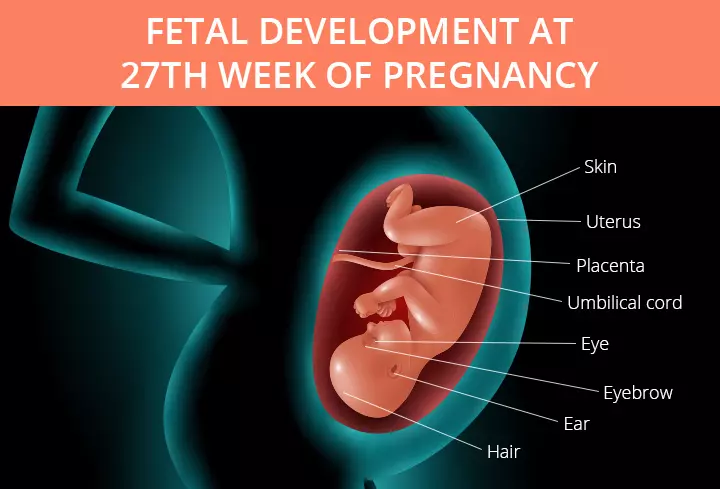
Here is how the baby inside your womb is developing this week:
| Body Parts | Development |
|---|---|
| Eyes (3) | Eyelids begin to open and close. Pupils dilate and start responding to light (4) |
| Nose | Is fully operational and able to sense smell. |
| Skin | Is less wrinkled and starts depositing fat beneath the skin layer. Skin is covered with vernix. |
| Brain | Is growing rapidly, taking half the energy that the fetus gets. |
| Nervous system | Starts controlling some body functions. |
| Bones (5) | Foot bones and thigh bones are about two inches long. |
| Lungs, Liver, and Immune system (6) | Not fully matured. |
| Ears | The ability to hear continues to develop, and the baby may recognize the sound of your voice. |
Fetal position and movement: In this week, the baby still has enough space to move inside the womb and attain any position. The movements are vigorous and the kicks you feel this week are stronger than before. You may feel the baby taking hiccups. By this week, the baby develops a regular sleep and wake-up pattern during the day.
What symptoms of pregnancy do you experience in the 27th week?
As the body changes, you experience the following symptoms in this week of the third trimester:
- Weight gain per week, as per the BMI (7):
| BMI | Below 18.5 | 18.5 – 24.9 | 25 – 29.9 | 30 and Above |
|---|---|---|---|---|
| Weight gain (lb/ week) | 1-1.3 | 0.8-1 | 0.5-0.7 | 0.4-0.6 |
- A pregnant women of normal weight with less than 30 minutes of exercise a week should strive for a calorie intake of 2,200 by eating a diet of grains, dairy, protein, fruits/ vegetables, and healthy fats and oils. Limiting processed foods, sugars, and extra fats can help you attain your goals.
- Leg cramps are a discomfort usually experienced during the night time due to over-exertion, dehydration, low content of minerals potassium, calcium, or magnesium.
- Backaches due to the pressure exerted by the extra weight of the baby on the hips and the lower back.

- The digestion process slows down as the progesterone hormone relaxes the digestive tract, leading to constipation.
- An extra pressure exerted on the nerves in the pelvic and rectal areas might cause hemorrhoids in a few women.
- Pressure on the nerves of hands and wrists, due to an increased blood volume leading to build up of fluid in the tissues, causes a tingling effect or numbness in fingers, hands, and wrists called the Carpal Tunnel Syndrome. It usually goes away a few weeks after the delivery.
- The extra weight of the baby, body aches, cramps, and frequent urination leads to insomnia.
- The bladder is compressed by the growing uterus, increasing the frequency of urination.
- Due to the pressure on the bladder, you may unexpectedly pee while you sneeze, a phenomenon nicknamed ‘snissing’.
- Excess retention of water in the body causes swelling of the legs, hands, and face, also known as edema. Drinking a lot of water helps expel the excess water.
- The loosening of the gums, due to hormonal fluctuations, make it more sensitive causing bleeding of the gums.
- Rising hormones in pregnancy causes blood vessels to relax and widen, causing increased blood flow to your baby but slows the return of blood into the veins to you. This results in reduced blood flow to the brain, causing dizziness.
- Restless Leg Syndrome (RLS) is the uncontrollable urge to move the legs to relieve the uncomfortable tingling effects. Low hemoglobin ((specifically rise in estrogen levels), a history of RLS before conception, or RLS during the previous pregnancy could be a reason for this syndrome (8).
- The nasal membranes open up due to hormonal changes, resulting in more mucus secretion that further leads to a stuffy nose or nasal congestion.
- Round ligament pain due to the stretching of muscles and ligaments in the lower abdomen.
- Braxton Hicks contractions are irregular, unpredictable, uncomfortable and less painful contractions that help prepare the body for labor. These are normal and go away when you try to switch your positions, relax (warm bath/ massage/ read a book/ listen to music/ nap) or drink water to rehydrate.
- Morning sickness may also be experienced during this week of pregnancy.
 Be watchful
Be watchful[ Read: 29th Week Pregnant ]
Bodily Changes You Experience In The 27th Week
Along with the symptoms mentioned above, you will experience certain physiological and psychological changes as well.
Physical changes:

- An enlarged belly with the navel popping out
- Enlarged breasts
- Darker areola and nipples
- Stretch marks
- Linea nigra
- Shinier, fuller, and thicker hair
- Fast growing and brittle nails
Emotional changes:
- Mood swings
- Anxiety and fear
In the case of severe or unusual symptoms, consult your doctor without delay.
When To Call The Doctor
Call your doctor immediately if you notice any of the following symptoms (9):
- Dizziness
- Headache
- Fever
- Belly or pelvic pain
- Uncontrolled nosebleeds
- Persistent leg cramps
- Urination with burning sensation or pain
Certain symptoms including vaginal bleeding, leaking of amniotic fluid, strong contractions every five minutes, and a noticeable change in fetal movements, could indicate preterm labor and delivery.
Your OB/GYN Visit

The OB/GYN visit this week will include:
- Weight and blood pressure check-up
- Measuring the fundal height
- Urine test
- Ultrasound scanning in case of twin pregnancy or high-risk pregnancies to monitor the fetal growth.
- Glucose tolerance test: This is a screening test to check the blood sugar level. It involves two approaches, one step or two step (10).
- One step (OGTT): Fasting blood sugar levels are tested, following which you have to drink 75 gm of glucose. The blood is drawn again for testing, at intervals of 1 hour and 2 hours to measure the glucose levels.
- Two-step: A blood sample is drawn two hours after you drink 75gm of glucose. This test is called the glucose challenge test. In case of an abnormal test result, a glucose tolerance test is done. Blood is drawn during fasting, and later at intervals of one, two, and three hours to check the glucose levels. Any abnormality in the test result indicates gestational diabetes.
Take the prescribed medications, if any, and follow the lifestyle and dietary changes that the obstetrician recommends to keep gestational diabetes and other conditions at bay.
Sarah, a mother of two, shares the status of her fetus as per the 27th-week sonogram, “He weighed in at 2 pounds, 4 ounces and is in the 54th percentile. (Mommy likes those numbers…very average.) His heart rate was around 155ish. The photos confirm he’s still a boy, and we got a number of cute facial profile pics. I’m going to have the hubs scan them at work tomorrow, and I will post them ASAP (i)!”
 Expert says
Expert saysTips For Mom-to-be

- Drink plenty of fluids to prevent cramps and support the increased blood volume your body experiences during pregnancy.
- Use cushions or pillows for sitting comfortably. Also, support your baby bump with a pillow while sleeping.
- Eat home cooked food. Include fish (12oz a week) in the diet as they are rich in omega-3 fatty acids. Avoid shark, king mackerel and tilefish.
- Avoid oily and deep-fried foods as they may trigger heartburn.
- Keep stress and fears at bay.
- Whole grain bread, fruits and vegetables, bran, and breakfast cereals make a healthy diet. Take more fiber-rich food to relieve constipation.
- Get proper rest.
- Avoid smoking, alcohol consumption, and excess caffeine intake.
- Stay calm and relaxed.
- Do not forget to take prenatal vitamins, iron, calcium, and folic acid supplements.
- Go for regular dental check-ups.
- Go for walking and do Kegel exercises to strengthen the pelvic floor muscles.
- Avoid lifting heavy objects.
- Avoid OTC medicines and ask the doctor before taking them if needed.
- Wear breathable and loose clothes, with comfortable footwear.
- Stay away from toxic chemicals.
- Avoid cat litter cleaning to prevent toxoplasmosis.
Getting your partner to help, can make this phase easy to deal with.
Tips For Dad-to-be
Here’s what your partner can do:
- Accompany you to the prenatal visits.
- Create a happy environment at home, maybe even use soothing light and sound effects.
- Help you with the daily household chores.
- Start shopping for maternal wears.
- Go for an outing.
- Give you a neck and foot massage.
- Help you exercise.
- Help find names for your baby.
 Quick tip
Quick tipFrequently Asked Questions
1. What should I expect at 27 weeks pregnant with twins?
If you are 27 weeks pregnant with twins, you will likely feel fatigued. Therefore, it is important to take care of your body during this time and get as much rest as possible (12).
2. How should I prepare myself during the 27th week of pregnancy?
By the time you are 27 weeks pregnant, you should ensure you have enrolled yourself in childbirth classes so that you can finish them by week 37 and you are fully prepared for the baby (13).
3. What are some potential complications to watch out for during the 27th week of pregnancy?
Potential issues to watch out for during the 27th week of pregnancy include gestational diabetes, preeclampsia, urinary tract infections, and premature labor. It is critical to have frequent prenatal check-ups and to promptly report any concerning symptoms to healthcare experts for proper examination and management (14).
4. Can a baby survive outside of the womb if born prematurely at 27 weeks?
Babies delivered at 27 weeks have a possibility of survival if they receive prompt specialized neonatal care. They have high chances of survival, with around 9 out of 10 newborns surviving. However, babies who survive have a slightly greater chance of long-term mild to moderate disabilities (15).
5. How does the baby’s immune system develop during the 27th week of pregnancy?
During the 27th week of pregnancy, the baby’s immune system continues to develop. B and T lymphocytes and important immune cells mature and become present in the spleen. However, the baby still relies on the mother’s antibodies, as their immune system is still developing (16).
6. How often should a woman see her healthcare provider during the 27th week of pregnancy?
If you’re in good health and don’t have any complicated risk factors, you can expect to see your doctor every four weeks until the 28th week of pregnancy (17).
The 27th week pregnancy is the end of the second trimester, and your baby can be as big as a head of cauliflower at this time. This week, babies can hear, sense smell, and open and close eyes, and the skin appears less wrinkled. Although the lungs are not fully matured, rapid brain development and the ability of the nervous system to control certain body functions are seen from the 27th week. Leg cramps, weight gain, backache, frequent urination, and digestive issues are common 27th-week pregnancy symptoms.
Infographic: What To Expect During 27th Week Of Gestation
The second trimester of pregnancy ends at week 27, and you are now roughly three months away from holding the baby in your arms. While you must be anticipating the arrival of your child and feeling happy, there are certain symptoms you may experience this week. Check out the infographic below to learn about these symptoms.
Some thing wrong with infographic shortcode. please verify shortcode syntaxIllustration: 27th Week Pregnancy: Symptoms Baby Development And Tips
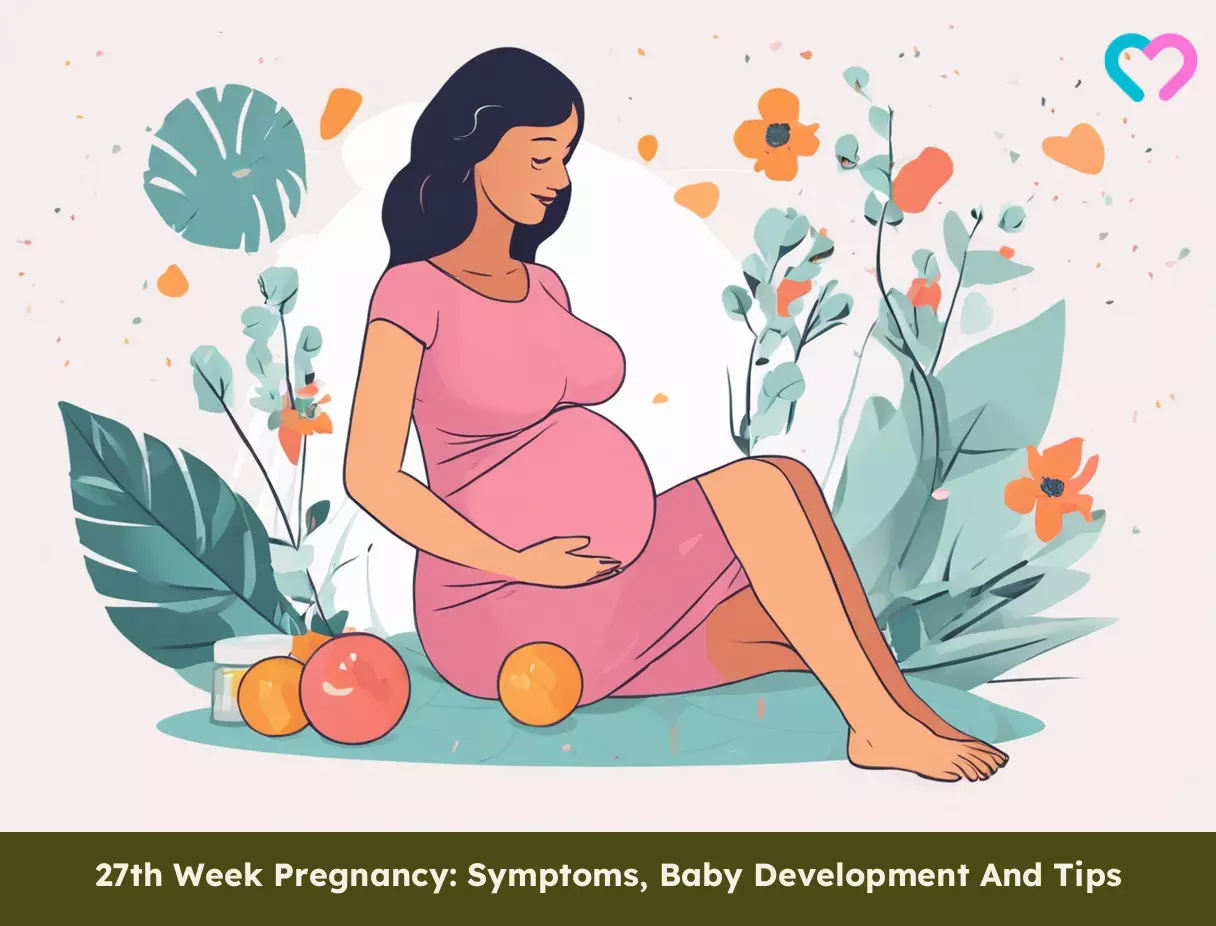
Image: Stable Diffusion/MomJunction Design Team
Personal Experience: Source
MomJunction articles include first-hand experiences to provide you with better insights through real-life narratives. Here are the sources of personal accounts referenced in this article.
i. 27 weeks: Appointment #6.http://www.seeingallsides.com/2012/04/27-weeks-appointment-6.html
References
- 27 weeks pregnant – all you need to know.
https://www.tommys.org/pregnancy-information/im-pregnant/pregnancy-week-by-week/27-weeks-pregnant - Fetal Development.
https://embryology.med.unsw.edu.au/embryology/index.php/Fetal_Development - Fetal development.
https://medlineplus.gov/ency/article/002398.htm - Prenatal Form and Function – The Making of an Earth Suit.
https://www.ehd.org/dev_article_unit16.php - Prenatal Summary.
https://www.ehd.org/prenatal-summary.php - Week 27.
https://kidshealth.org/en/parents/week27.html - Pregnancy Weight Gain.
https://babyyourbaby.org/pregnancy/during-pregnancy/weight-gain/ - R. Gupta et al; (2016); Restless legs syndrome and pregnancy: prevalence, possible pathophysiological mechanisms and treatment.
https://www.ncbi.nlm.nih.gov/pmc/articles/PMC5562408/ - Warning signs during pregnancy.
https://www.pregnancybirthbaby.org.au/warning-signs-during-pregnancy - Glucose screening tests during pregnancy.
https://medlineplus.gov/ency/article/007562.htm - Vaccines During and After Pregnancy.
https://www.cdc.gov/vaccines-pregnancy/recommended-vaccines/index.html - Fatigue and tiredness during pregnancy.
https://www.pregnancybirthbaby.org.au/dealing-with-fatigue-during-your-pregnancy - Pregnancy Week 27
https://americanpregnancy.org/healthy-pregnancy/week-by-week/27-weeks-pregnant/ - What are some common complications of pregnancy?
https://www.nichd.nih.gov/health/topics/pregnancy/conditioninfo/complications - Risk of having a premature baby delivering between 26 and 30 weeks of pregnancy.
https://www.liverpoolwomens.nhs.uk/media/3366/risk-of-having-a-premature-baby-delivering-between-26-and-30-weeks-of-pregnancy.pdf - A R Hayward; (1983); The human fetus and newborn: development of the immune response.
https://pubmed.ncbi.nlm.nih.gov/6606446/ - Pregnant? Here’s How Often You’ll Likely See Your Doctor.
https://health.clevelandclinic.org/prenatal-appointment-schedule
Community Experiences
Join the conversation and become a part of our nurturing community! Share your stories, experiences, and insights to connect with fellow parents.
Read full bio of Dr. Shalini MA
Read full bio of shreeja pillai
Read full bio of Rebecca Malachi
Read full bio of Aneesha Amonz






